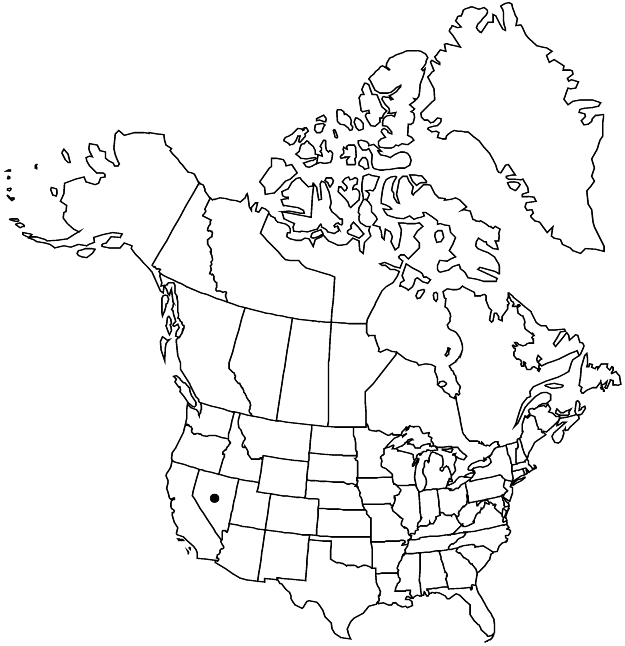Difference between revisions of "Eriogonum kingii"
Proc. Amer. Acad. Arts 8: 165. 1870.
FNA>Volume Importer |
imported>Volume Importer |
||
| (5 intermediate revisions by one other user not shown) | |||
| Line 8: | Line 8: | ||
}} | }} | ||
|common_names=Ruby Mountains wild buckwheat | |common_names=Ruby Mountains wild buckwheat | ||
| + | |special_status={{Treatment/ID/Special_status | ||
| + | |code=E | ||
| + | |label=Endemic | ||
| + | }} | ||
|basionyms= | |basionyms= | ||
|synonyms= | |synonyms= | ||
| Line 24: | Line 28: | ||
|elevation=1600-3300 m | |elevation=1600-3300 m | ||
|distribution=Nev. | |distribution=Nev. | ||
| − | |discussion=<p>Eriogonum kingii is known only from Elko and northern White Pine counties. It is occasionally cultivated in rock gardens.</p> | + | |discussion=<p><i>Eriogonum kingii</i> is known only from Elko and northern White Pine counties. It is occasionally cultivated in rock gardens.</p> |
|tables= | |tables= | ||
|references= | |references= | ||
| Line 33: | Line 37: | ||
-->{{#Taxon: | -->{{#Taxon: | ||
name=Eriogonum kingii | name=Eriogonum kingii | ||
| − | |||
|authority=Torrey & A. Gray | |authority=Torrey & A. Gray | ||
|rank=species | |rank=species | ||
| Line 47: | Line 50: | ||
|publication title=Proc. Amer. Acad. Arts | |publication title=Proc. Amer. Acad. Arts | ||
|publication year=1870 | |publication year=1870 | ||
| − | |special status= | + | |special status=Endemic |
| − | |source xml=https:// | + | |source xml=https://bitbucket.org/aafc-mbb/fna-data-curation/src/2e0870ddd59836b60bcf96646a41e87ea5a5943a/coarse_grained_fna_xml/V5/V5_545.xml |
|subfamily=Polygonaceae subfam. Eriogonoideae | |subfamily=Polygonaceae subfam. Eriogonoideae | ||
|genus=Eriogonum | |genus=Eriogonum | ||
Latest revision as of 22:12, 5 November 2020
Herbs, matted, scapose, 0.2–1.5 × 0.5–4 dm, tomentose or floccose to subglabrous, greenish or grayish. Stems matted, with persistent leaf bases, up to 1/5 height of plant; caudex stems matted; aerial flowering stems scapelike, erect, slender, solid, not fistulose, 0.2–1(–1.5) dm, tomen-tose or floccose to subglabrous or even glabrous. Leaves basal, fasciculate in terminal tufts; petiole (0.2–)0.4–2(–3) cm, tomentose; blade oblanceolate to spatulate or elliptic, 0.5–1.5(–2) × (0.2–)0.3–0.8(–1) cm, densely white- or greenish-tomentose on both surfaces, margins plane. Inflorescences capitate, 0.8–1.7(–2) cm; branches absent; bracts 3–5, linear to narrowly scalelike, triangular, 1.5–3 mm. Peduncles absent. Involucres 3–5 per cluster, turbinate-campanulate to campanulate, 2.5–3.5 × 2.5–4 mm, membranous, sparsely pubescent or rarely sparsely glandular abaxially; teeth 5–6, erect to spreading, 0.7–1.8(–2) mm. Flowers (2.5–)3–3.5 mm; perianth greenish yellow or pale yellow, rarely yellow, glabrous or sparsely glandular abaxially; tepals connate proximal 1/4–1/2, monomorphic, spatulate to obovate; stamens exserted, 2–3.5 mm; filaments glabrous or sparsely pilose proximally. Achenes light brown, 2.5–3 mm, glabrous except for slightly papillate beak in some. 2n = 40.
Phenology: Flowering Jun–Sep.
Habitat: Limestone or granitic gravelly slopes and ridges, mixed grassland and sagebrush communities, pinyon-juniper and subalpine conifer woodlands
Elevation: 1600-3300 m
Discussion
Eriogonum kingii is known only from Elko and northern White Pine counties. It is occasionally cultivated in rock gardens.
Selected References
None.
